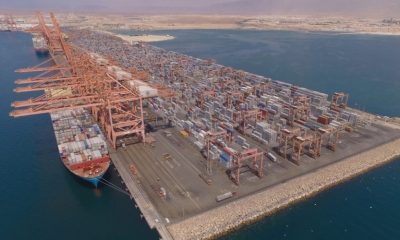Retail
Digitization and Logistics Service Providers Can Help SMEs Make the Most of Peak Season Retail Trends

Every year, the holiday season serves as a huge opportunity for regional organizations, irrespective of their size, to connect with new customers, expand to new markets and create new avenues of growth. Despite a growing local e-commerce landscape, the availability of products from international e-tailers is giving consumers the chance to source products from all over the world, presenting both opportunities and challenges to businesses. A PwC report states that retail peaks such as Black Friday, or White Friday as it is known in the Middle East, are becoming more and more popular with consumers in the region.
Today, as a result of digitization and interconnectivity seeping through every aspect of life, consumers can easily access global and regional marketplaces and shopping platforms. This offers shoppers various choices of products and services, personalization of retail experience, and convenience, instantly raising customer expectations.
Unmet customer needs can make or break an SME retail business, especially during peak or holiday seasons. Digitization gives consumers the power to control the way retailers and technology approach them and equally enables those SMEs which invest and adopt digitization to respond to the growing need for customization and capitalize on peak season trends.
Digitization enables SMEs to sell their products on multiple overseas e-commerce websites, offering them access to the same customer groups as larger more established players. Digitization also extends to inventory through the Internet of Things (IoT) technology, where SMEs can leverage planning tools, particularly to manage customer demands and fulfilling shopper expectations when it comes to seeing stock availability. This is one area where SMEs can collaborate with their logistics service provider to boost their e-commerce potential throughout the year, especially during the heavy-traffic peak seasons.
Logistics service providers can help SMEs to build a solid integrated supply chain that can provide value-added services such as package tracking, and to identify technology or process gaps. Adoption of technology by SMEs in their retail operations and processes also supports better integration with the services of the logistics provider when every stock keeping unit has a distinct digital identity.
Technology can also be a game-changer in the economic contribution of SMEs. SMEs constitute around 90 percent of registered companies in the Middle East and North Africa region, but they only make up 15 to 30 percent of the region’s GDP. To grow this share, they need to digitize faster and move online.
SMEs must look at joining the e-commerce marketplace as a fast track to growth, and make the most of retail campaigns such as Dubai Shopping Festival or the peak season e-commerce promotions such as Black Friday.
As consumers increasingly turn to e-commerce for their shopping needs, faster delivery and transparency isn’t just an option; it’s the expectation of the online shopping experience. If SME retail businesses want a shot at market share, a focus on delivering what, how, and when the shopper wants is a critical part of building a satisfied customer who is likely to return again, and again.
-

 Alamaliktistaad Magazines2 months ago
Alamaliktistaad Magazines2 months agoAl-iktisaad, November 24
-

 Oman2 months ago
Oman2 months agoShell Oman Partners with Oneroad Automotive Gives Away 2 Forthing Cars as Part of its ‘Win Big’ Campaign
-

 Energy1 month ago
Energy1 month agoOman and Belgium Strengthen Green Hydrogen Partnership with New Landmark Agreement
-

 Energy1 month ago
Energy1 month agoOUTLOOK: Emerging Markets and Renewables – The Twin Engines of Energy Growth for 2025
-

 Technology1 month ago
Technology1 month agoEXCLUSIVE: Technological Singularity – Will It Become Humanity’s Greatest Leap or Its Most Perilous Step?
-

 OER Magazines1 month ago
OER Magazines1 month agoOER Magazine: December 2024 Edition – The Most Trusted Brands in Oman
-

 Oman1 month ago
Oman1 month agoOman Braces for Launch of First Experimental Rocket Duqm-1 on 4 December 2024
-

 Oman1 month ago
Oman1 month agoTransport Ministry Issues New Regulation for Security of Ships, Ports






























